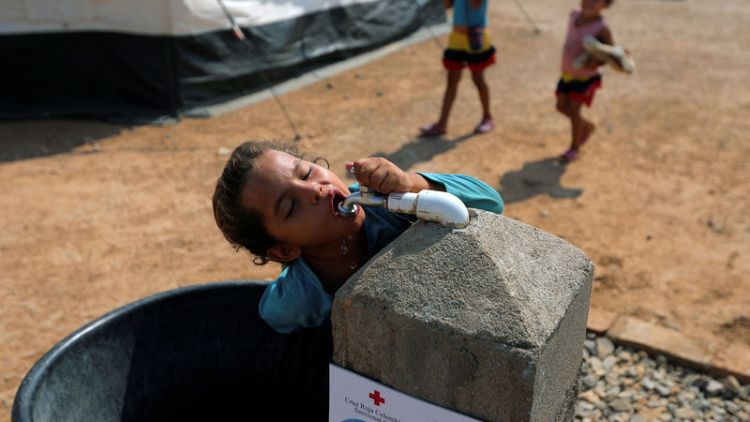By Steven Grattan
MAICAO, Colombia, (Reuters) - Sheltered from the harsh midday sun by the tent she now calls home, Maria Moreno bursts into tears recalling how she and her six children fled their native Venezuela a month ago for the border city of Maicao in northern Colombia.
"For three days, my children went without absolutely anything," she said, as she breastfed her seven-month-old son in a camp run by the United Nations refugee agency UNHCR.
The camp, the only one of its kind in Colombia, opened in March in a bid to provide some shelter for the rising number of Venezuelans fleeing a humanitarian crisis in their homeland.
Moreno and her children, the oldest of whom is 10, can stay here for six weeks.
Hyperinflation has put basic food and medicine beyond the reach of most citizens in Venezuela and the United Nations estimates that roughly a quarter of the country's 30 million people need humanitarian assistance.
Though more than 1.2 million Venezuelans have fled to Colombia, the country has until recently sought to avoid setting up camps for fear they may attract additional migrants and slow integration into Colombian society.
But pressure from the local government of historically poor Maicao forced Colombia's hand, said Felipe Munoz, the country's border director. A 17 percent increase in Maicao's 160,000 population has strained public services like health centres and schools, he said.
"After we found so many people living on Maicao's streets - which is the most complicated place for the migration crisis along the border - we decided to ask UNHCR for help," Munoz said.
The camp's 60 tents can accommodate up to 350 people and to date more than 480 have stayed there. The UNHCR is considering a possible expansion to allow up to 1,400 people at a time.
The United Nations is involved in a similar camp in northern Brazil and also supports shelters in Colombian border cities that provide small-scale accommodation for migrants.
Colombian and U.N. officials take pains to emphasise the Maicao camp is temporary - an attempt to give the most vulnerable migrants housing while they prepare to continue to other destinations or get jobs. But officials say it will remain open as long as it is needed and can be funded.
GROWING CONCERN
Colombians have largely welcomed Venezuelans in recent years - remembering how Venezuela provided refuge during Colombia's own long civil conflict. But there is growing concern in many cities about the potential of migrant labour to undercut Colombian workers.
Like the 28-year-old Moreno, most people living at the camp had previously slept on the streets with their young children. She earned the equivalent of just a few dollars a day selling water and candies.
"I wasn't able to sleep at night on the street because of the children. There were people all around: I was more alert than a security guard," said the single mother, who used to work in a shrimp packing factory in Venezuela's western state of Zulia.
"I've no idea what we'll do when we have to leave," she said.
The waiting list is 400 people long said camp official Marco Rotunno.
"The need is very real," he said.
Before they can live at the camp, migrants have to undergo a series of health checks for diseases like tuberculosis and measles, on the rise in Venezuela due to the lack of healthcare services there.
Many are glad of the respite the camp brings. Denire Sierra, 38 weeks pregnant, arrived four weeks ago.
"I feel more secure. I've more food, I don't have to be in the sun," said Sierra, 21, as she collected her six-year-old from the camp's daycare.
Some migrants are already looking ahead, making plans for when their stay ends.
Tomas Urdaneta, a 35-year-old former security guard, is at the camp with his wife and two children. He arrived in Colombia three months ago and has scratched a living selling water on the street and picking through trash for recyclables.
The UN is going to fund the family's onward travel to Bogota.
"My brother-in-law has something lined up for me, working in a restaurant," Urdaneta said. "He's waiting for me to arrive."
(Reporting by Steven Grattan; Editing by Julia Symmes Cobb and James Dalgleish)
